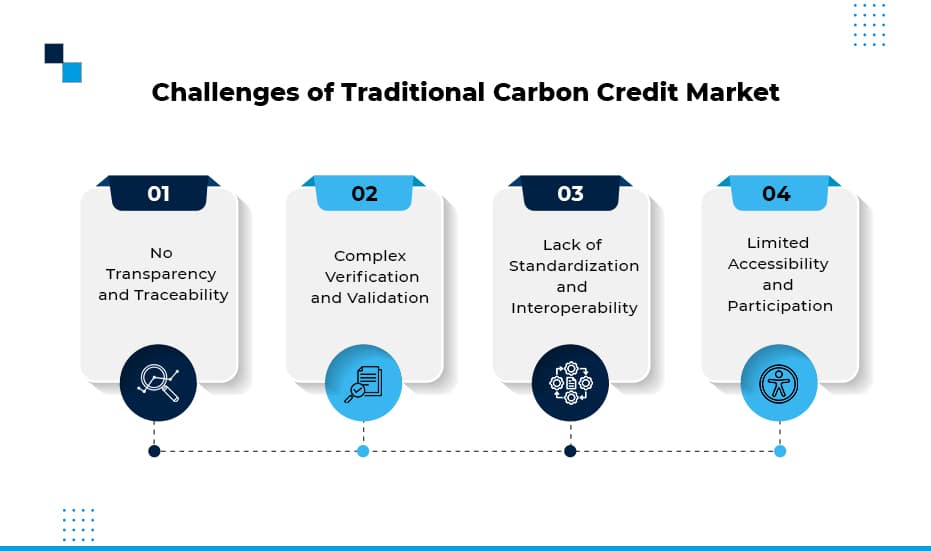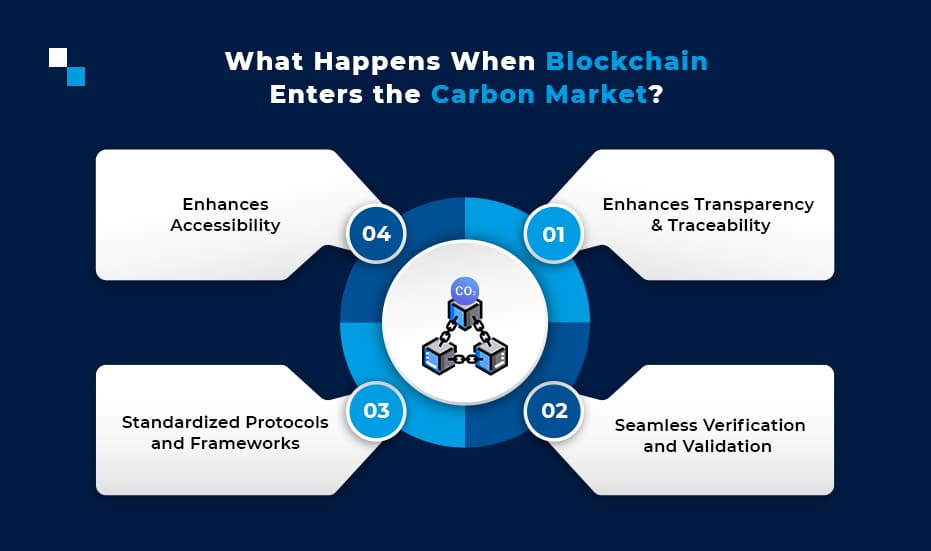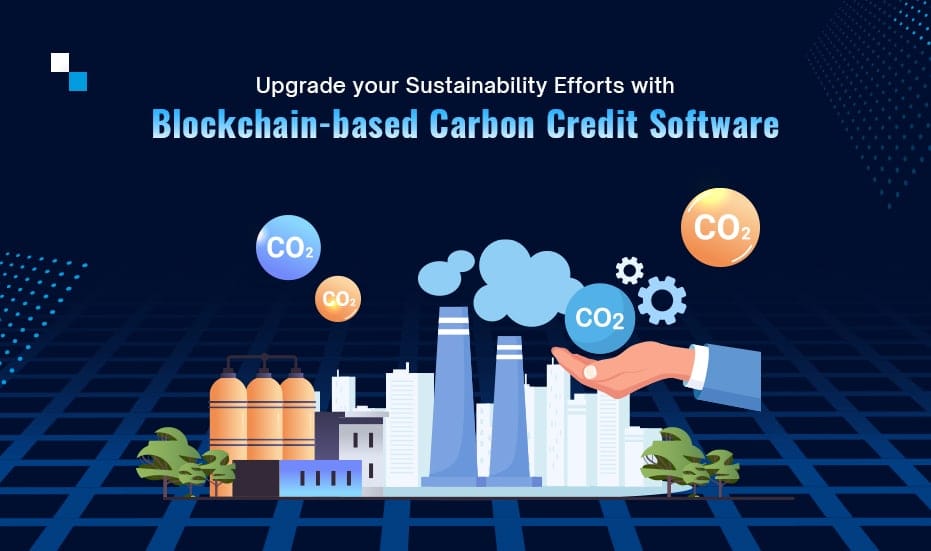
Unleashing Your Potential: Music Marketing in the Metaverse
July 14, 2023
AI-Based Crypto Market Maker Bot: Step-by-step Development Guide
July 17, 2023In the phase of mounting urgency to address climate change, several startups are experimenting with the potential of Blockchain in the carbon credit market. Companies such as Return, Open Forest Protocol, Toucan, and Topl emphasize building Blockchain tools to issue carbon credits. Although the initial resistance led many organizations to not embrace the technology, today, the picture has completely changed.
The carbon credit market is booming every year. Not only the number of credits purchased in 2020 doubled as compared to 2017, but the demand for these credits is also expected to exponentially increase. Today, several companies want to tap into this fast-developing sector. However, several challenges in the carbon credit market, such as lack of transparency and traceability, limited interoperability, etc., restrict them from investing in the market. This is where Blockchain-based carbon credit software steps in.
In this blog post, we will find the answers to the following questions
- What is the significance of carbon credits in combating climate change?
- What are the challenges of traditional carbon credit software systems?
- How Blockchain resolves the challenges of the traditional carbon credit industry?
- List of companies leveraging Blockchain for carbon credits
- Choose Antier as your trusted carbon credit software development partner
What is the Significance of Carbon Credits in Combating Climate Change?
Climate change has become a major global problem that needs to be addressed with an impactful solution. In this fight against climate change, carbon credits have emerged as a significant measure.
Carbon credits, also known as a carbon offset, represent the unit of measurement for reducing greenhouse gas emissions. Let’s explore the significance of carbon credits in combating climate change.
- Driving Emission Reductions
Carbon credit plays a crucial role in reducing carbon emissions across various sectors. Carbon credits assign a monetary value to carbon emissions that incentivize organizations to shift to cleaner technologies that are energy efficient and reduce carbon footprint. Such an approach encourages more businesses to participate in this sustainable practice, leading to a reduction in greenhouse gas emissions. Carbon credits promote the seamless transition to low-carbon economies that help countries to combat climate change on a global scale.
- Encouraging Sustainable Development
Carbon credit software fosters sustainable development by channeling investments toward low-carbon projects. Developing nations can attract financial support for renewable energy infrastructure, forest conservation, and sustainable agriculture and can benefit from this sustainable approach. These projects can help contribute to climate change mitigation by enhancing resilience, promoting biodiversity, and supporting local communities.
- Facilitating International Cooperation
Carbon credits facilitate international cooperation in addressing climate change through several initiatives, including the Clean Development Mechanism (CDM) and the Paris Agreement. These initiatives bring countries together to collaborate on emission reduction efforts.
Carbon trading software offers a great mechanism for developed countries to support emission reduction projects in developing nations that help them achieve their climate goals. It also fosters global partnerships and creates opportunities for businesses across borders to come and invest in sustainable technologies and practices.
- Restoring Natural Ecosystems
When it comes to the restoration and conservation of the natural ecosystem, carbon credits have emerged as a great tool. Projects focusing on reforestation, afforestation, and conservation help reduce the GHG in the atmosphere, mitigate climate change, and provide numerous benefits, such as biodiversity preservation, soil conservation, and water management.
What are the Challenges of Traditional Carbon Credit Systems?
Besides providing a number of benefits, traditional carbon trading software systems also face significant challenges in achieving transparency, traceability, and efficiency in the carbon credit market. The following are challenges that need to be addressed with the ideal solution.

- Lack of Transparency and Traceability
Transparency and traceability are one of the major concerns of the carbon credit system. The traditional carbon credit system is often unable to provide transparent and auditable records of carbon credit transactions. Hence, the verification of carbon credits becomes challenging, which raises the chances of fraudulent activities, double-counting, and shatters the trust in the carbon credit market. The absence of standardized reporting and tracking mechanisms also makes it difficult to compare and assess the environmental impact of different projects.
- Complex Verification and Validation Processes
Verifying and validating the carbon credits is crucial in order to ensure their legitimacy and accuracy. The traditional carbon credit systems often involve manual audits, paperwork, and lengthy and time-consuming verification procedures, causing bottlenecks, and increasing the costs of carbon credit issuance. Such a complex process also limits the scalability of the carbon credit market and affects its ability to mitigate climate change. Above all, the lack of consistent methodologies and standardized criteria for validating carbon offset projects is also one of the major challenges faced by traditional carbon credit systems.
- Lack of Standardization and Interoperability
The lack of standardized approaches makes it difficult to compare, evaluate and trade carbon credits across different projects and regions. On the other hand, the absence of interoperability affects the transfer and trading of carbon credits between various platforms and jurisdictions. Both of these challenges create fragmentations in the carbon credit market that hinder its efficiency and impact the climate change mitigation.
- Limited Accessibility and Participation
The traditional carbon trading software has been criticized for its limited accessibility. Larger entities and established players in the market are able to benefit from the carbon credit system. The high cost involved in registration, verification, and maintenance of carbon credits restricts the startups, small-scale participants, and community-based projects to benefit the system and drive widespread emission reduction. The lack of clarity and understanding around the carbon credit process is also a reason why potential participants don’t engage in carbon offset initiatives.
How Blockchain Resolves the Challenges of the Traditional Carbon Credit Industry?
The emergence of Blockchain technology offers a promising solution to overcome the challenges of the carbon credit market. The following points shed light on how Blockchain resolves the challenges associated with carbon credits.

- Enhances Transparency and Traceability
Blockchain is a decentralized and transparent ledger that records every carbon credit transaction and issuance. The technology helps determine the origin of the credits. The traceability benefit ensures the integrity of the carbon credits. Additionally, the immutability feature of Blockchain prevents tampering or manipulation of data and maintains a trustworthy system for tracking carbon credits.
- Seamless Verification and Validation
Blockchain-based carbon credit software automates the verification and validation process through the use of smart contracts. These self-executing contracts automatically verify the eligibility of carbon reduction projects, ensuring they meet predefined criteria. This automation saves an individual’s time and efforts, streamlines the processes, reduces costs, and eliminates the need for manual audit that makes them more accurate and efficient.
- Enables Creation of Standardized Protocols and Frameworks
Smart contracts can be designed to enforce common standards to ensure interoperability among different platforms and make the process of trading and transfer of carbon credits convenient. The standardization offered by Blockchain technology reduces barriers and promotes a more efficient and integrated carbon credit market to explore.
- Enhances Accessibility
As we have already discussed that the traditional carbon credit market has limited accessibility, Blockchain helps address this problem by providing a more inclusive and accessible platform for participation. The transparency, automation, and lower transaction costs make carbon credits more accessible for small businesses and startups. The technology also simplifies the carbon trading process that encourages smaller entities to engage in carbon offset projects. Such increased participation fosters innovation and helps address climate change.

List of Companies Leveraging Blockchain for Carbon Credits
Several companies have recognized the potential of Blockchain technology in revolutionizing the carbon credit market. Here are a few examples of companies that are utilizing Blockchain-based solutions for carbon credits:
- IBM
“IBM Blockchain for Climate” is a Blockchain-based platform developed by IBM, aiming to create a transparent and secure ecosystem for carbon credits. This platform leverages the power of smart contracts and distributed ledger technology in order to track and verify carbon credits.
- Veridium
Veridium also focuses on utilizing Blockchain technology to create and manage carbon credits. The company developed a carbon credit software or platform called “VERDE” that uses Blockchain for verification and tracking carbon offset. The technology helps ensure the transparency and traceability of carbon credits.
- CarbonX
CarbonX is a Blockchain-based carbon offset exchange platform that enables businesses and individuals to buy, sell and trade carbon credits in a secure environment. The platform uses Blockchain to enhance transparency in carbon credit transactions and drive the transformation to a lower-carbon world economy.
- Climatecoin:
Climatecoin is a crypto project that aims to incentivize and fund environmental initiatives, including carbon credit projects. The company uses Blockchain technology to create a transparent and trusted marketplace for carbon offset transactions.
The above-listed companies leverage Blockchain technology and explore various benefits associated with it. As technology continues to gain momentum in the carbon credit market, we can expect more startups and established companies to adopt this transformative technology to address the challenges of the traditional carbon credit system.
Choose Antier as Your Trusted Carbon Credit Software Development Partner
Antier is a leading Blockchain development company that is considered as a trusted carbon credit software development partner for the following reasons-
- Expertise in Carbon Credit Solutions
We at Antier specialize in developing innovative carbon credit software solutions. Our Blockchain developers have a deep understanding of the carbon credit market, regulatory frameworks, and sustainability initiatives that enables them to deliver tailored carbon trading software solutions, perfectly meeting the specific needs of organizations in this industry.
- Develop Customizable and Scalable Solutions
Antier better understands that every organization has unique requirements, and therefore, we follow a different approach for each project by working closely with clients and developing carbon trading software that aligns with their business objectives.
- Compliance and Security
While developing Blockchain-based carbon trading software, we also emphasize compliance and follow the best industry practices to develop a solution that meets the necessary regulatory requirements and protects sensitive data.
- Domain Knowledge and Support
We have a huge team of Blockchain developers, possessing in-depth domain knowledge of the carbon credit market. Our experts provide complete guidance to clients throughout the carbon credit software development process. Additionally, our support services also provide timely client assistance and troubleshooting of the software whenever needed.
- Track Record and Reputation
Antier holds a good track record and reputation in the market. Our client testimonials clearly show our expertise in the carbon credit industry and help a business owner or individual to make an informed decision while choosing a company.

Conclusion
The introduction of Blockchain technology in the carbon credit market can address the challenge traditional systems face. With its inherent features of transparency, traceability, and efficiency, Blockchain technology can eliminate the negatives of the traditional carbon credit system and enhance its integrity, streamline the processes, and foster trust among stakeholders. Blockchain-based carbon credit software development opens up opportunities for smaller entities and drives sustainable development at a global scale. Embracing this technology will surely pave the way for a brighter future.



